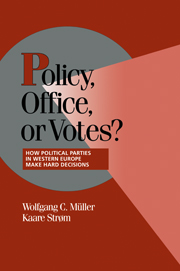Book contents
- Frontmatter
- Contents
- Figures
- Tables
- Contributors
- Chapter 1 Political Parties and Hard Choices
- Chapter 2 Office, Votes, and Then Policy: Hard Choices for Political Parties in the Republic of Ireland, 1981–1992
- Chapter 3 Party Behaviour and the Formation of Minority Coalition Governments: Danish Experiences from the 1970s and 1980s
- Chapter 4 From Policy-Seeking to Office-Seeking: The Metamorphosis of the Spanish Socialist Workers Party
- Chapter 5 Changing Strategies: The Dilemma of the Dutch Labour Party
- Chapter 6 Party Behavior in a Polarized System: The Italian Communist Party and the Historic Compromise
- Chapter 7 Decision for Opposition: The Austrian Socialist Party's Abandonment of Government Participation in 1966
- Chapter 8 Leadership Accountability and Bargaining Failure in Norway: The Presthus Debacle
- Chapter 9 Winner Takes All: The FDP in 1982–1983: Maximizing Votes, Office, and Policy?
- Chapter 10 Trade-offs in Swedish Constitutional Design: The Monarchy under Challenge
- Chapter 11 Parliamentary Rules and Party Behavior during Minority Government in France
- Chapter 12 Conclusions: Party Behavior and Representative Democracy
- Index
- Titles in the series
Chapter 9 - Winner Takes All: The FDP in 1982–1983: Maximizing Votes, Office, and Policy?
Published online by Cambridge University Press: 05 May 2010
- Frontmatter
- Contents
- Figures
- Tables
- Contributors
- Chapter 1 Political Parties and Hard Choices
- Chapter 2 Office, Votes, and Then Policy: Hard Choices for Political Parties in the Republic of Ireland, 1981–1992
- Chapter 3 Party Behaviour and the Formation of Minority Coalition Governments: Danish Experiences from the 1970s and 1980s
- Chapter 4 From Policy-Seeking to Office-Seeking: The Metamorphosis of the Spanish Socialist Workers Party
- Chapter 5 Changing Strategies: The Dilemma of the Dutch Labour Party
- Chapter 6 Party Behavior in a Polarized System: The Italian Communist Party and the Historic Compromise
- Chapter 7 Decision for Opposition: The Austrian Socialist Party's Abandonment of Government Participation in 1966
- Chapter 8 Leadership Accountability and Bargaining Failure in Norway: The Presthus Debacle
- Chapter 9 Winner Takes All: The FDP in 1982–1983: Maximizing Votes, Office, and Policy?
- Chapter 10 Trade-offs in Swedish Constitutional Design: The Monarchy under Challenge
- Chapter 11 Parliamentary Rules and Party Behavior during Minority Government in France
- Chapter 12 Conclusions: Party Behavior and Representative Democracy
- Index
- Titles in the series
Summary
INTRODUCTION
Politics is about choice. It is therefore hardly surprising that political parties, still the central actor in most parliamentary democracies, frequently incur situations in which they need to make hard choices – choices between office, votes, and policies (Strøm 1990). Under specific conditions, however, parties may find themselves able to reach all three goals to a satisfactory degree, even if at the outset the strategy that allows them to do so may look risky. This chapter is concerned with such a case. The analysis of the developments that led to the breakup of the Social–Liberal coalition on 17 September 1982 shows that the FDP, conceptualized as a unitary actor, was confronted with a strategic choice in which most of the benefits in the end clearly lay with only one of the feasible courses of action, namely, the decision to leave the Social–Liberal coalition under Chancellor Helmut Schmidt and form a new government with the Christian Democratic parties. The subsequent account shows that the Free Democrats (FDP) was in a uniquely favourable position that ultimately allowed it to maximize office, votes, and, within limits, policy influence at the same time. Yet, this was a risky strategy ex ante, and the short-term costs could have been substantial, particularly if the party had been forced to face the electorate shortly after its defection.
There was a price, however, which demonstrates the importance of accounting for intraorganizational constraints: Party unity was severely disrupted, particularly among leadership circles. The party leaders responsible for this decision survived, but they were certainly bloodied.
- Type
- Chapter
- Information
- Policy, Office, or Votes?How Political Parties in Western Europe Make Hard Decisions, pp. 216 - 236Publisher: Cambridge University PressPrint publication year: 1999
- 8
- Cited by



